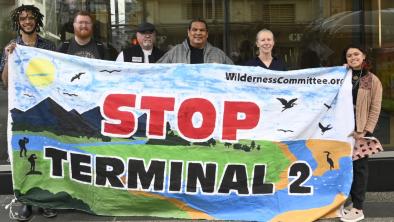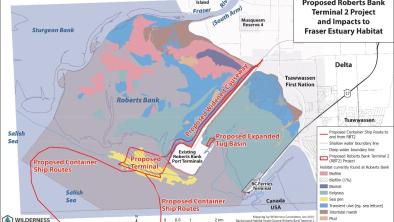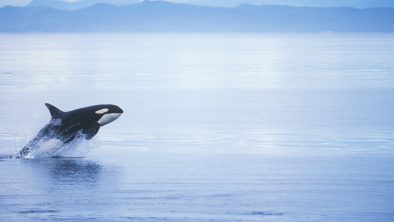Lawsuit forces Canada to protect endangered killer whales
For Immediate Release February 25, 2009
Stunning policy reversal could mark turning point for 85 remaining whales
VANCOUVER, BC - After British Columbians celebrated the unexpected arrival of two newborn killer whales last week, there is another new cause for hope for BCs imperilled killer whale populations. This week, the federal government issued an Order that will provide legal protection for the endangered species habitat - a stunning policy reversal after a lawsuit was launched by environmentalists last year.
The lawsuit was filed by Ecojustice, formerly Sierra Legal Defence Fund, on behalf of nine of Canada and BCs leading environmental organizations. It alleged that the Department of Fisheries and Oceans had failed to require much-needed legal protection for the killer whales critical habitat. DFO had claimed instead that existing laws and unenforceable guidelines were sufficient to protect the orcas habitat from serious threats like toxic contamination, acoustic degradation and declining salmon stocks.
"To recover, killer whales need more than the status quo from the federal government and so were thrilled our lawsuit forced it to issue this habitat protection Order," said Ecojustice lawyer Lara Tessaro. "Now well be pushing to ensure this Order leads to action."
The federal governments complete turnaround marks a victory for BCs most iconic species and for the environmental groups behind the lawsuit: Dogwood Initiative, Environmental Defence, David Suzuki Foundation, Raincoast Conservation Society, Sierra Club of BC, International Fund for Animal Welfare, Greenpeace, Georgia Strait Alliance and Wilderness Committee. It also marks the first time that Canada has ever issued an Order under its Species at Risk Act to protect critical habitat.
However, the Order does not reference threats to critical habitat documented by scientists in the governments Resident Killer Whale Recovery Strategy.
"We know we need to change the way we care for our marine environment to protect killer whales and their habitat," said Kathy Heise, Marine Scientist with Raincoast Conservation. "We hope to work with DFO to incorporate the needs of killer whales into the management of our salmon fisheries."
"To give this Order teeth, DFO must keep killer whales critical habitat free of tanker traffic and the risk of catastrophic oil spills," said Will Horter of Dogwood Initiative.
Killer whales face many serious threats throughout their habitat on the west coast such as declining salmon stocks, increased boat traffic, toxic contamination, and acoustic impacts from dredging, seismic testing and military sonar. DFO is scheduled to release an action plan within the next four years, but still has not created an action planning team with independent killer whale scientists.
"Each time we think the government has finally given these ailing populations greater legal protection, they find a way to avoid meaningful change. Is this another hollow promise or will the federal government do the right thing and prohibit harmful activities in the orcas critical habitat?" asked Sarah King of Greenpeace.
Kim Elmslie of the International Fund for Animal Welfare stated, "We will continue to monitor DFO to ensure that every effort is made to protect this critically endangered species for future generations."
"This is one landmark victory on the long road to killer whale recovery. Were relieved to see the government using the Species At Risk Act and we look forward to seeing similar habitat protection Orders for other endangered species," said Aaron Freeman of Environmental Defence.
-30-


